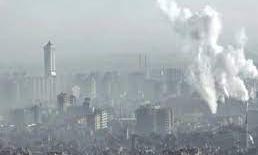
Air pollution and wildfires linked to 135 million premature deaths
text_fieldsA study led by researchers from Singapore's Nanyang Technological University (NTU) has linked pollution from human activities and natural sources, such as wildfires, to approximately 135 million premature deaths globally between 1980 and 2020.
The study highlighted that weather phenomena like El Nino and the Indian Ocean Dipole exacerbated these effects by increasing pollutant concentrations in the air.
The research focused on particulate matter 2.5 (PM 2.5), tiny particles harmful to human health when inhaled, as they can enter the bloodstream. These particles originate from vehicle and industrial emissions, as well as natural sources like fires and dust storms. The study, published in the journal Environment International, found that PM 2.5 pollution was significantly associated with premature deaths caused by conditions such as stroke, heart and lung disease, and cancer.
The study revealed that weather patterns intensified the death toll by 14 percent. Asia, particularly China and India, experienced the highest number of premature deaths attributable to PM 2.5 pollution, with over 98 million deaths. Other countries like Pakistan, Bangladesh, Indonesia, and Japan also reported significant numbers of premature deaths, ranging from 2 to 5 million.
This research, one of the most comprehensive to date on air quality and climate, used 40 years of data to analyze the health impacts of particulate matter. "Our findings show that changes in climate patterns can worsen air pollution," said Steve Yim, an associate professor at NTU's Asian School of the Environment, who led the study.
He emphasized that events like El Nino can elevate pollution levels, leading to increased premature deaths due to PM 2.5 pollution.
The study utilized satellite data from NASA to assess particulate matter levels in the Earth's atmosphere and analyzed mortality statistics linked to pollution from the US-based Institute for Health Metrics and Evaluation. Weather pattern data were obtained from the US National Oceanic and Atmospheric Administration.
Future research will explore the impact of climate change on air pollution.
Collaborators from universities in Hong Kong, Britain, and China also contributed to the study. According to the World Health Organization, the combined effects of ambient and household air pollution result in approximately 6.7 million premature deaths annually worldwide.

















